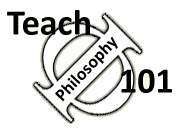Teach Philosophy 101
Free resources for
philosophy teachers!
"One of the most comprehensive, well-researched, and accessible guides for teachers that I have ever seen." James Lang, Chronicle of Higher Education (read full review of TΦ101)
Lack of Background
Our students know a lot of things but they often do not know very much at all about the things you may take for granted.
-
Vocabulary. Ask your students to read a passage aloud, and you may be amazed at the words that seem unfamiliar to them. There are other words, which they recognize, but that they cannot define. TΦ101 once spent some time discussing a sentence from Marx that described globalized capitalism as having given "a cosmopolitan character to production and consumption in every country." While the students all knew the word "cosmopolitan" they tended to read it as meaning "sophisticated," rather than as "international."
-
Historical timelines. Students may have covered world history in high school, but they do not necessarily have the ability to apply what they learned to other subjects, and they are often confused about what happened in what order. So, for example, students cannot be expected to know that just because Plato was an Ancient Greek philosopher, he must have lived before Jesus, or Descartes. You will notice that students will, for example, sometimes assume that Plato was influenced by Christianity because of the similarities they see between the two.
-
Historical or literary references. In the same way, students cannot be expected to have a clear grasp of famous literary works, people, or events. Many of them will understand these terms, but those who most need to understand you may be the ones who don't get the reference.
-
Don't ask, don't tell. Also, students frequently do not ask questions about things they do not understand or look up things even in cases when they are reading the assigned material on a laptop! Students don't typically take the extra steps them would help them understand a work, and that is where you, the instructor, come in.
This requires teachers to be consciously filling in the gaps, giving historical context, explaining terms, and, in general, asking for feedback from students as to whether they have actually understood what they heard or read.
Professor's Blindspots
This all can be put in another way as well. Some research suggests that knowing more about a subject makes you less able to explain it to others. Mitchell Nathan et. al., call this the "pedagogical blind spot." The idea is that specific subject expertise "can also lead educators to organize their pedagogy in accordance with the structure of the domain rather than the learning needs of novices." Having spent years of our life with a subject, in other words, we sometimes present it according to a complete different logic.
Resources:
Bruer, John T. Schools for thought: A science of learning in the classroom. MIT press, 1994. See Chapter 3 "Intelligent Novices: Knowing How to Learn."
Nathan, Mitchell, et. al. Expert Blind Spot: When Content Knowledge and Pedagogical Knowledge Collide.
Finn, Stephen, et.al. The Philosophy Skills Book. New York: Continuum, 2012. This is one of the few philosophy texts that actually tries to meet students where they live, by focusing on basic questions such as vocabulary and how to read a difficult text.
Author: John Immerwahr
Update: September, 17, 2014, December 2019; 1-19-2026-D. Sackris
